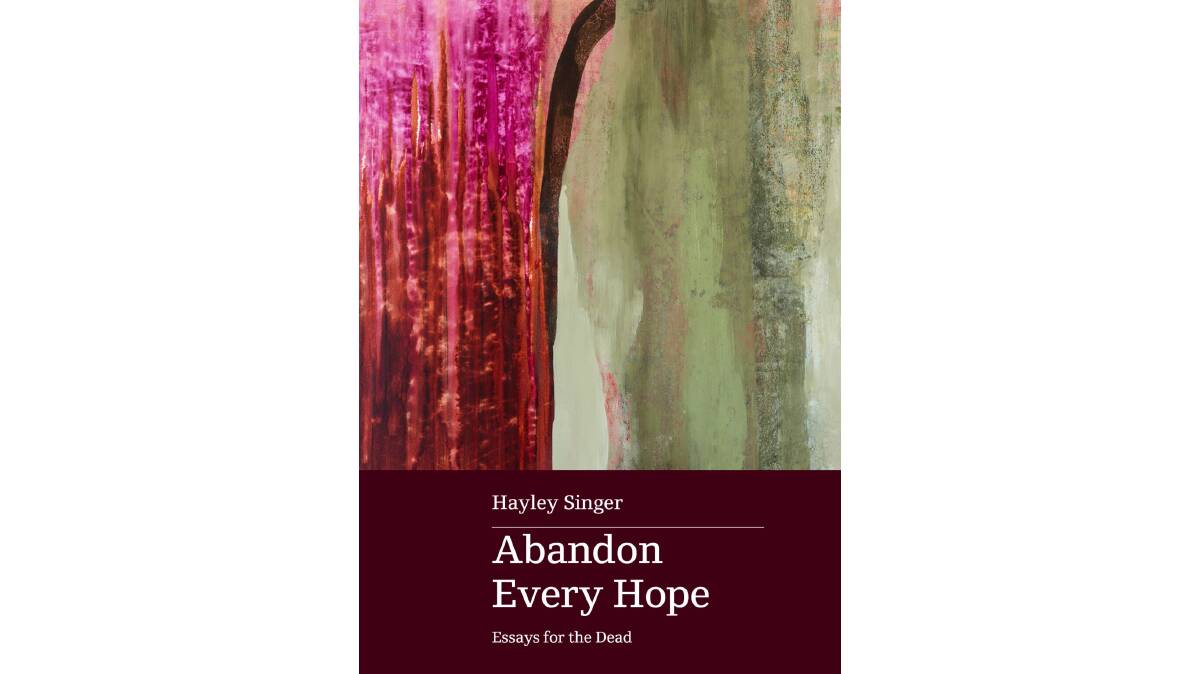Writing & News
from The Canberra Times by Jasper Lindell 25 March 2023
- Abandon Every Hope: Essays for the dead by Hayley Singer. Upswell. 180pp. $29.99.
On those regular enough nights when, after work, I cannot be bothered cooking very much, I know I can buy a roast chicken in a little plastic bag sitting in a supermarket warmer for little more than $10.
The gnarly business of killing the chicken, removing its feathers, stuffing it and sending it through an oven is done for me. Cutting it up after getting it home, I do not for a moment need to consider a chicken’s mortality and humanity’s efficient means of animal murder. All I see is a convenient dinner for two, with leftovers for lunch the next day.
I imagine Hayley Singer wants me to see a warmed cabinet of death in the supermarket rather than an easy dinner option. And I think Singer partly succeeded, because mid-way through reading Abandon Every Hope: Essays for the Dead, I found myself troubled by the supermarket-cooked bird carcass sitting on my chopping board one evening, where previously I had just seen a meal: a couple of drumsticks and future sandwich filling.
Singer’s essays are about what humans do to animals, and each other. They focus on the horrors of mechanised slaughter the edifice of the food supply chain keeps out of mind and out of view. Abattoir comes from a French word which means “to slaughter”, Singer notes towards the end of the collection. It serves as a kind of helpful euphemism, perhaps helping those of who are happy to go on eating meat not to think of them as slaughterhouses, even though that is what they are.

Going beyond a euphemistic relationship with food production takes nerve. Singer’s essays are at their strongest when they describe this hidden world of animal pain, human indifference and industrial efficiency.
“Their prolonged and agonised cries convey only a limited dimension of their suffering,” Singer writes of farmed pigs. “Their wounded bodies bear the unbearable. To live as tools. To be broken in stages, through severe physical restriction. Tied to a post. Clamped to the floor. By disease or overuse.” In this pig farm, “banal-seeming technologies [transform] into deadly constellations. Like, truck-fence-knife. Like, ship-heat-shit. Like, bars-hunger-boredom.”
Abandon Every Hope, however, remains largely academic. Not just because it is laced with theory, quotes and the thoughts of other thinkers and writers, widely varied. This gives the collection the feel of a notebook, with Singer showing her working out. But it also retains a sense of remove from the horrors it describes. Singer vividly and movingly describes the slaughter of animals, giving life to their pain where others have been guided to become desensitised.
Yet, these essays are difficult to read, experimental and complex. Singer, who teaches creative writing in Melbourne, has spoken of writing as its own research process, the act of writing as a means of discovering. That is certainly evident in Abandon Every Hope, but it comes at the cost to clear communication.
Despite the difficulty of these essays, I found them compelling. Singer’s reflections on the relationship between language and animal cruelty are at the heart of this collection. What is a writer to do when they come face to face with this reality? Singer’s answer is to keep writing through the pain. The bit that I’m unsure of is who is that writing for? The people who are yet to see what we collectively do to others who live but are not like us, or the animals who can’t be heard? What good is writing in a way that won’t change the minds of people who have the power to stop the slaughter?
“Despite the population of farmed animals, and the sheer profusion of their bodily products, literature that attends to their lives and deaths remains marginal,” Singer says. “There is a “song of nothing” beyond a “ruined landscape of language”, made up of the statistics of slaughter: “herd counts, units of value, weight, profit, loss and liquidation”. That song of nothing is probably why lots of people are comfortable bringing home a cooked chicken from the supermarket and dissecting it.
Mirroring the animal pain in Singer’s essays is the human stupidity. The final, and I thought strongest essay, “Inferno”, charts the impact of COVID-19 on pig farmers, forced to murder countless pigs because their bodies cannot be processed; the human workers are sick. The result is violent, cruel and wasteful. Farmers need to find efficient ways to kill lots of pigs quickly, which leads to usual welfare standards slipping.
Singer’s skill likes in controlling the level of discomfort in the essays to the point where you feel it as a reader but don’t put the book down for a breath of fresh air or a long stare out the window, reflecting on your own part in all this. That comes with the feelings that linger, resurfacing over a steak dinner – or a commercially roasted chook.